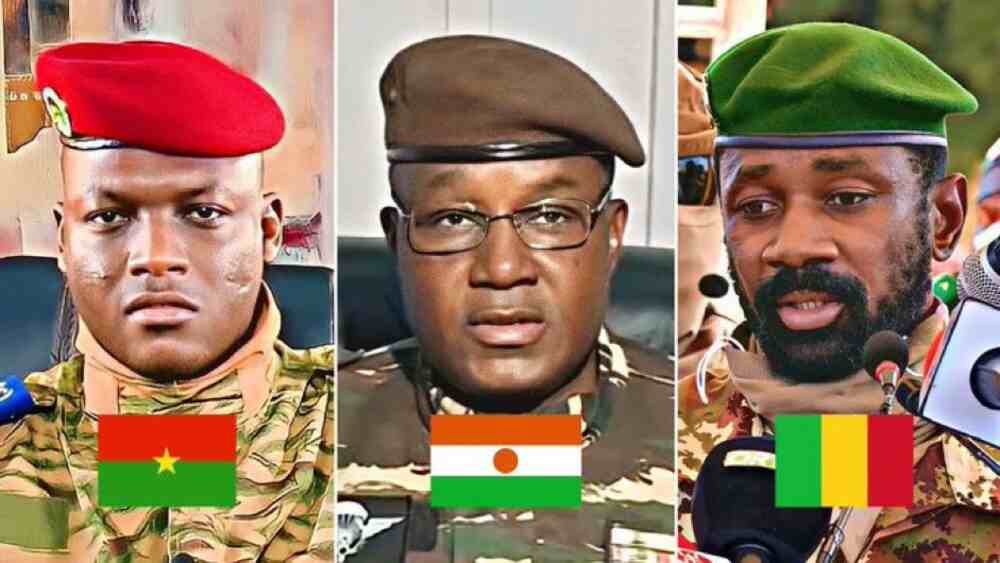ECOWAS: Tinubu Faces Fresh Economic Burden In Wake Of Burkina Faso, Mali, Niger Exit From Regional Bloc – Varsity Don
President Bola Tinubu faces a fresh economic burden and struggle to maintain harmony as the Economic Community of West African States (ECOWAS) grapples with the withdrawal of Burkina Faso, Mali, and Niger from the regional bloc.
The ECOWAS breakaway presents Nigeria with a complex challenge of navigating diplomatic channels for reconciliation while also preparing for potential economic burdens and lead efforts to maintain regional stability and free trade.
Advertisement
While Nigeria’s Ministry of Foreign Affairs pledges continued diplomatic efforts for their reintegration, concerns swirl about potential economic liabilities for Nigeria, the bloc’s biggest financial contributor.
Professor Ghali Shereef, Head of Political Science at the University of Abuja, told THE WHISTLER in an interview that he foresees transfer of more financial liabilities to Nigeria in the wake the countries’ exit from ECOWAS.
The bloc relies heavily on a community levy, a 0.5% tax on imports from non-members, which bankrolls 70-90% of its budget.
Nigeria, the region’s economic giant, shouldered 40.42% of the total $2.9 billion contributed in 2020.
Advertisement
With the departure of the three states, which collectively contributed $879.71 million, Nigeria now faces a potential “joint liability shift,” as Professor Ghali Shereef puts it.
This could mean shouldering the financial gap left by the departing states, adding to Nigeria’s already hefty responsibilities within the bloc.
“If the bloc or region is not able to actually meet up with the financial responsibility, it will be more liability for Nigeria,” the University don stated.
But the repercussions extend beyond finances.
The withdrawal threatens the very fabric of ECOWAS, a cornerstone of West African unity and free trade.
Advertisement
Professor Shereef warned of a fractured regional market and disrupted movement of goods and people which are key pillars of the bloc’s economic ambitions.
This, he said, can have cascading effects, impacting businesses, individuals, and the overall economic health of the region.
“The three countries will now find it difficult to travel because some of them are landlocked, especially Burkina Faso, Niger, even Mali, to a significant level and now, they will also have to be looking for visa to get into their neighbouring states.
“But for Nigeria, we have a bigger implication because some Nigeriens have already become Nigerians and vice versa and there is intermarriage. Nigeria has a great task ahead in order to see how it identifies Nigeriens and how they will repatriate them,” the don said.
Shereef added, “ECOWAS is free trade area where free movement of goods, people and services are actually guaranteed and with their exit, it means that a Nigerian cannot freely enter Niger Republic freely and vice versa; we will need visas before we travel there in and out.
“It is going to affect free trade in which ECOWAS is trying to break this particular barrier by establishing the Africa Continental Free Trade Area.
Advertisement
“We may not actually experience this in the longer term because once these military leaders arrange and schedule for elections, once a democratically elected government comes to power, they might decide to return to ECOWAS because the junta don’t follow constitution and they pass laws by decrees.
“For the democratic leadership, it is in the interest of their citizens to actually return to ECOWAS for better integration, cooperation among the member States.”
The professor noted that there are rules governing withdrawal from ECOWAS, but admitted that the bloc cannot force the sovereign countries to remain members.
He called for massive diplomatic engagement as it would be in the interest of ECOWAS for the three states to return to the bloc and prevent “recolonisation” of countries in the region.
“The only thing is that they have created a pariah status for themselves but again, the implication for the entire subregion is that they have declared allegiance to Russia and we are trying to invite France to come to Nigeria and the Western powers will continue to recolonize the region if care is not taken,” the don added.
While Nigeria, as the current chair of ECOWAS, finds itself at a crossroads, the country’s foreign ministry emphasised its commitment to diplomatic engagement, seeking to lure the breakaway states back into the fold.
Professor Shereef echoes this sentiment, stressing the importance of sustained diplomatic efforts for the sake of regional stability and economic prosperity.
However, the path ahead is fraught with challenges as the junta-led governments in the breakaway states, accused of betraying democratic principles, may not readily bend to diplomatic pressure.
Their alleged allegiance to Russia adds a complex geopolitical layer to the equation.
In a chat with THE WHISTLER, the spokesperson for Nigeria’s foreign ministry, Francisca Omayuli, reiterated that the country “remains open for engagement,” adding “It goes without saying that diplomatic efforts at all levels will be sustained until that is achieved.”
In its reaction earlier, the ECOWAS Commission said the breakaway countries have not formally withdrawn in line with relevant rules and that “Burkina Faso, Niger, and Mali remain important members of the Community and the Authority.”



